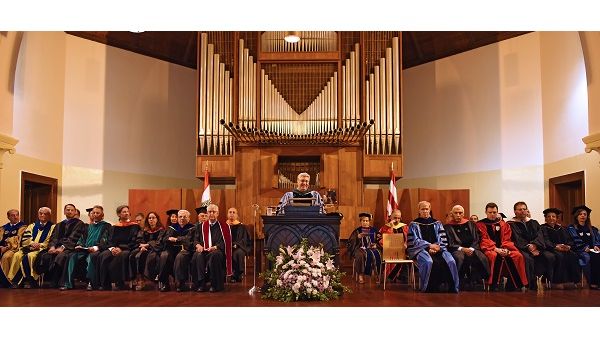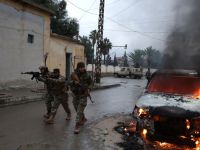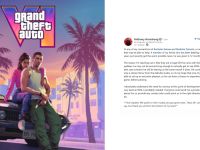AUB Officially Opens New Academic Year

The American University of Beirut (AUB) opened its new academic year in an official ceremony held in Assembly Hall, on campus.
The ceremony was headed by AUB President Dr. Fadlo R. Khuri. Chairman of the Board of Trustees Dr. Philip S. Khoury, Provost Mohammad Harajli, deans, trustees, vice presidents, faculty, students and various university stakeholders were present in the ceremony.
Entry of the Academic Procession, comprising the President, deans, faculty and trustees signaled the start of the ceremony. This was followed by the Lebanese National Anthem. President Khuri then took the podium and delivered his address, entitled: “Against the Grain”; he said: “Steve Jobs, Apple founder and entrepreneur extraordinaire once said: "If you want to make everyone happy, don't be a leader. Sell ice cream." And he was right. The great Nobel Laureate Marie Curie once said: "I was taught that the path to progress is neither swift nor easy." At any rate, of all of our university's many accomplishments, I can recall neither easy nor swift progress, nor in fact any patents on the making of ice cream. So our choice and our path must necessarily lie elsewhere.”
“Today we live in a world more complex than the one my peers and I grew up in, but also more opportune. We have far more sophisticated tools at our disposal than those that presented themselves to our forefathers and ancestors and we can use considerably superior instruments to educate, carry out cutting-edge research, and serve those less fortunate. But along with that, it is fair to say that the challenges and indeed the mental strains and the instruments of separatism, of isolation, and indeed of violence and inequality have also proliferated and advanced manifold over the last decades,” he continued.
“We live in an era where the seemingly preventable and curable plague of cholera has tragically and unnecessarily taken and could take as many as 1,000,000 innocent lives in Yemen, when the devastating war in Syria has resulted in more than 500,000 dead and over 10 million internally and externally displaced citizens, when we are no closer than we ever were to alleviating the suffering and restoring the rights of the Palestinian people to their own land, when the refugee and economic crises continue to weigh on a Lebanese society still without consistent or acceptable electricity, water, sanitation, or other basic services, living in a nation making glacial progress in the drive to social justice and egalitarian treatment under the law. Sadly, the rest of the Arab world is plagued with many of the same challenges and lacks Lebanon’s immense advantage of an open society unencumbered by fear of free speech, for all of the surpassing talent, drive and determination we see in our wonderful youth. And yet still we believe, and in fact we know, that we can make a lasting difference for the peoples of Lebanon, the Arab world and beyond. It is fair to say that beyond our region social turmoil and economic inequality pervades and roils the planet,” he added.
“The painful events of Charlottesville Virginia, where citizens of the very same, 241-year-old American Republic, a Republic that was ultimately responsible for the defeat and dismantling of fascism in Europe a mere 72 years ago, demonstrated recently carrying the hateful symbols of racial supremacy that resulted in the murder of 25 million people held captive by the Nazis and their allies in the 1930s and 1940s,” Khuri continued.
“And what precisely is the role of our beloved and historic AUB? I think you can safely infer that I neither want all of you here, nor our almost 8,800 superb students, our more than 1,200 outstanding faculty of full and part timers, or our over 5,000 dedicated and resourceful staff, not to mention 65,000 plus alumni spread around the world to either stand up in revolt or alternatively join a rock 'n' roll band! Rather, I want us to begin to embody a meritocratic mini-society that can set an example of compassion, of progress, of ingenuity, of engagement and of service that can be an example to the world. And I am confident that we can, to use the current saying, "Walk the walk",” he said.
“I think we can all agree that education is the great equalizer in society. And AUB is the best testament to that. We have educated Jordanian and Lebanese Prime Ministers, Palestinian freedom fighters, Supreme Court Justices of several nations, Presidents of Sudan, Afghanistan and Syria among other nations, and legions of humanists, doctors, engineers, pharmacists, businessmen and women, teaching every one of them how to be tolerant, progressive, compassionate and thoughtful leaders in and of this world,” he added.
“In following the events of Charlottesville, the tragedies in Yemen, in Syria and in Barcelona most recently, I have always believed and continue to believe in our power to bring people together, in the rich streams of idealism that course through our university, its constitution and its history. Those values that many of us grew up cherishing and striving to uphold, are now actively under threat from extremists who want to keep out or expel all who are different from them in any way. They are not the values of an American liberal education that we believe in and we must work together so that our ideals and the opportunities they bring prevail, and not this uglier side of humanity that has manifested itself these last few weeks and months on the streets of cities around the world,” he continued.
“We have proposed before the Board a bold new AUB vision for the times, building on our past to state simply: "AUB is a globally unique institution of higher education whose community of scholars and practitioners embody integral service, teaching, and research, all of whom are dedicated to improve the human condition. This university models a just, resilient and relevant society, one which prepares its citizens to be highly impactful and indeed transformative for the challenges faced by the global, regional, and local communities and the people that comprise them",” Khuri said.
“The Association of Governing Boards of Universities and Colleges recently composed an executive summary of the challenges for the 21st-century college president. They entitled it: "The 21st-Century Presidency: A Call to Enterprise Leadership." The report urges presidents of universities to face the crises head on, noting that despite long-term uncertainty pervading the very mission of higher education institutions, that this is a period of immense opportunity, one not to be wasted. So let us work together to define the opportunities and how we intend to embrace them.
In the major speeches that I have previously given to the AUB community, I have sought to weave a coherent message that establishes the broad parameters of those opportunities and the path forward. From prior Opening Day remarks to Founders' Day speeches to Graduation addresses, with an inauguration and a speech on civil society in between, we have described a bold and confident university emerging from the constraints of the post-Civil War period to become ever more tolerant of risk, encouraging of the individual members of our community, defined not only by a history of significant positive impact but by bold plans to reclaim our destiny and move forward confidently as a community. A community that recognizes and values our legacy of service, honoring our long-standing faculty and staff members while embracing our humanism and overcoming our doubts. We are a university that is collectively poised and indeed strong enough to lend a hand of support to those least fortunate, to ensure that any extraordinary student who is accepted at AUB is supported to the limits of our ability, so that they too can make a positive difference in our world. Of alumni and faculty and students who create opportunities for others, of staff who understand the weight of expectations on them and mediate that stress while serving faithfully to empower others, such that their children and their children's children will one day aspire to boldly lead, innovate, and serve,” he added.
“And to all the accomplishments, we must now include providing opportunity, education and support for the many children who are pushed aside and polarized, the starving and the desperate. In building contact, opportunity, and empathy even for those who in their anger might otherwise seek to destroy and defile, we build a bridge that makes their future and ours all the more secure, all the more equal, all the more fulfilling and therefore all the more shared. Here, it is fitting that we remember the words once more of Abraham Lincoln. Faced with assuming the leadership of a fractured nation, rent asunder by the consummate evil of human slavery, Lincoln it was who in his first inaugural, desperate to avoid the terrible conflict that he surely knew was coming, ended his address with words that will forever endure: "I am loathe to close. We are not enemies, but friends. We must not be enemies. Though passion may have strained it must not break our bonds of affection. The mystic chords of memory, stretching from every battlefield and patriot grave to every living heart and hearthstone all over this broad land, will yet swell the chorus of the Union, when again touched, as surely they will be, by the better angels of our nature." Lincoln would prove to be wrong in this short-term prediction but not in his basic principle of a common, shared bond between the men and women of the Republic,” Khuri continued.
“Let us go against the ever-increasing grain of social isolation, of an inwardly looking sphere of higher education that purposes to define its boundaries, to guard against the outside world and its all-infecting value creep. Rather than railing against commercialism, technology, entrepreneurship, service to others, we boldly state, that as the great poet John Donne once said: "No man (and indeed no university) is an island." With the immensely powerful tools and guiding principles of our university focused on the need to lead in transforming science, health, culture and society, using these core foci as bridges to developing tomorrow's citizen leaders, we at AUB move forward in purpose and in confidence. In concert with other great universities in Lebanon and abroad, but always maintaining and upholding our fundamental values, AUB purposes to step out boldly into Lebanon and the Arab world. We send forth our fleet of ambassadors of knowledge, of excellence, and of understanding. Basking in the optimism of the first day of this defining year and emboldened by the history and purpose of a great university like no other, we therefore ask all assembled to step forward boldly into an era where AUB can and will make a difference for our students, our community and our world. Thank you very much,” he concluded.
The ceremony concluded with the Alma Mater, and was followed by a reception.
Background Information
American University of Beirut
Founded in 1866, the American University of Beirut is a teaching-centered research university based on the American liberal arts model of higher education. AUB has over 9,000 students and over 1,200 instructional faculty members. The University encourages freedom of thought and expression and seeks to graduate men and women committed to creative and critical thinking, lifelong learning, personal integrity, civic responsibility, and leadership.





